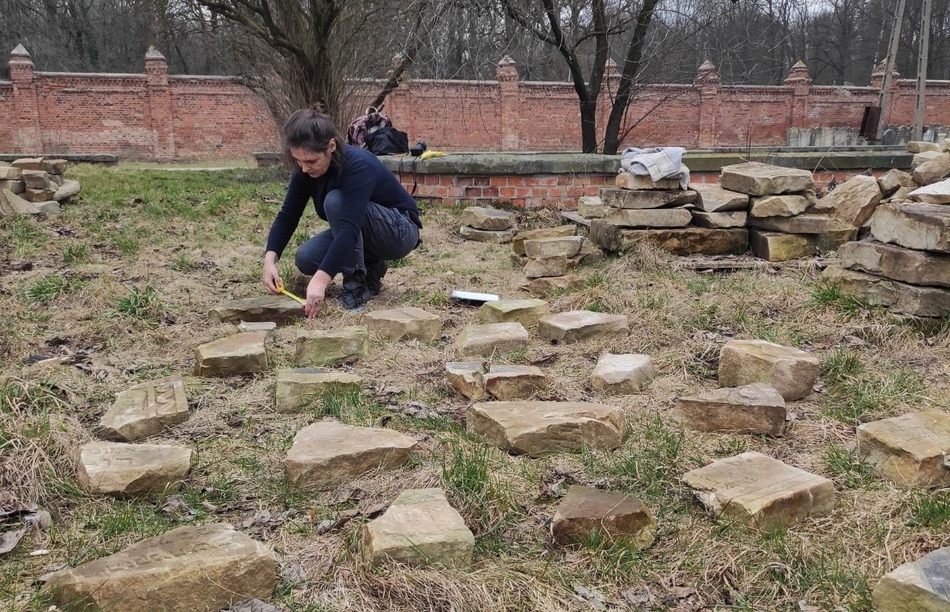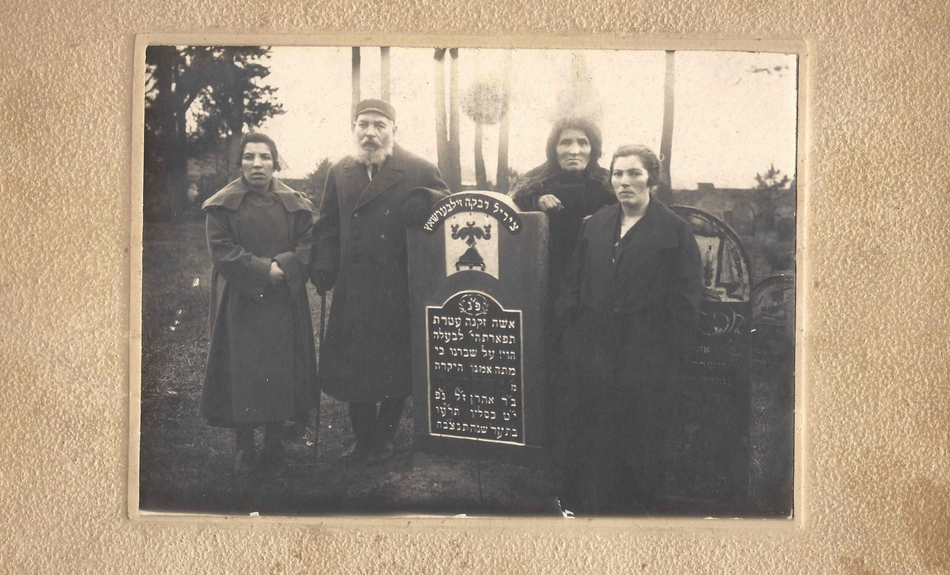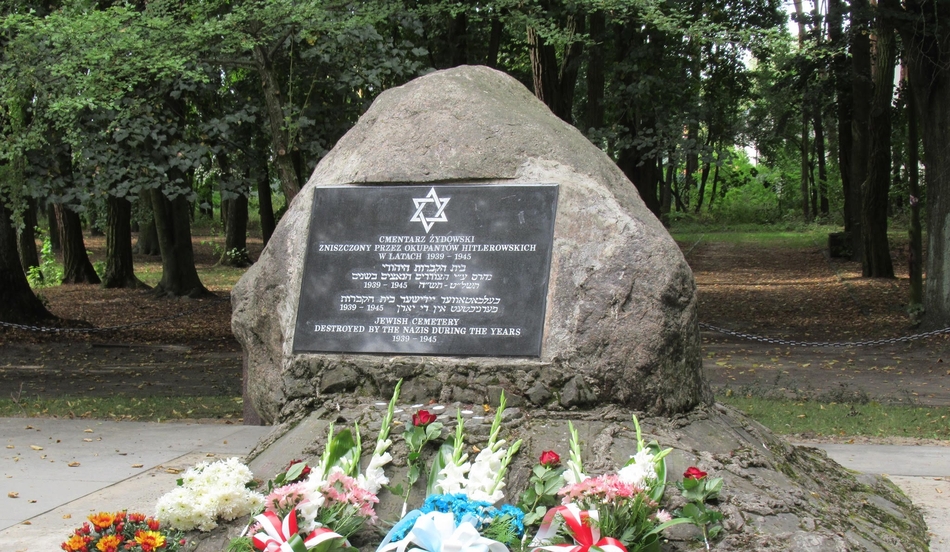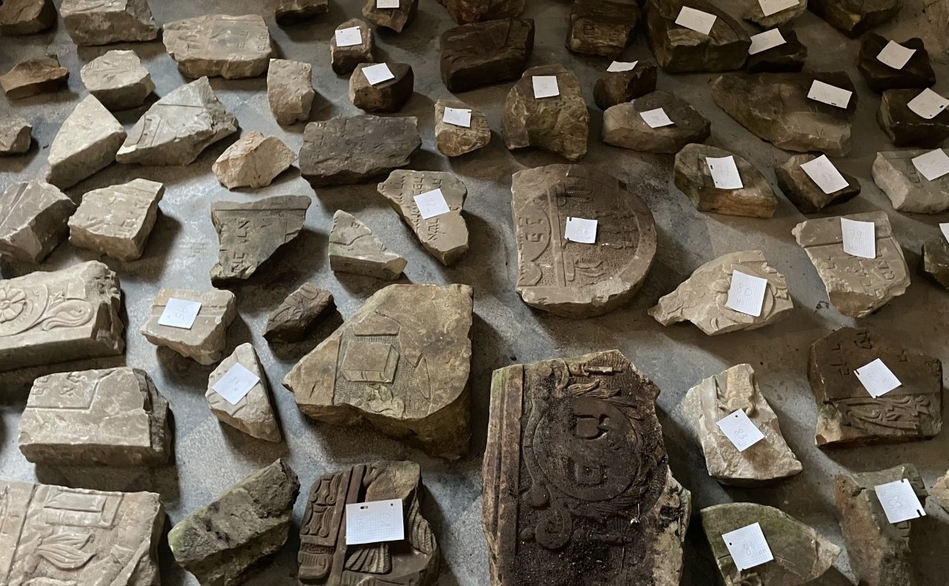Discovery during a bridge renovation
A huge accumulation of fragments of tombstones, used during the Nazi occupation to build the road and bridge on Cegielniana Street in the northern suburb of Bełchatów, was discovered by workers during the renovation of the bridge in 2019. They gathered them in one place and immediately informed the heritage conservator. The Jewish Community also learned about the find. The scientists from the University of Lodz were informed about it by the Friends Society of Bełchatów and the conservation services.
 Dr. Irmina Gadowska during inventory work after transporting the matzevahs to the cemetery at Bracka in Lodz.
Dr. Irmina Gadowska during inventory work after transporting the matzevahs to the cemetery at Bracka in Lodz.
In total, there were 1125 fragments of matzevahs – those larger ones – with inscriptions and with gold and coloured fillings of letters, as well as the so-called rubble without any inscriptions or ornaments. They came from a cemetery established in the 19th century on the southern outskirts of Bełchatów. Fragments of historical value, loaded by workers on 38 pallets, were transported to Lodz, to the Jewish cemetery at Bracka, where they were inventoried. Several matzevahs have been reconstructed
– says Dr Adam Sitarek.
Descendants of those buried in the Bełchatów cemetery
The scientists have also contacted the descendants of Jews identified this way and buried since the 19th century in the cemetery in Bełchatów. There were a lot of emotions – these people, thanks to the project of the scientists from the University of Lodz, after 80 years from the extermination of the Jewish community in Bełchatów, found the tombstones of their loved ones. Thanks to these contacts, valuable archival photos of the Jewish inhabitants of Bełchatów were also obtained.
 The Zylberszac family at the tombstone of Cyrel Rywka Zylberszac (Wajs), 1917 (courtesy of Scott Brown).
The Zylberszac family at the tombstone of Cyrel Rywka Zylberszac (Wajs), 1917 (courtesy of Scott Brown).
Students of Dr Irmina Gadowska, an art historian from the Department of History of Painting and Sculpture at the Faculty of Philosophy and History of the University of Lodz, took part in the renovation and documentation of fragments of matzevahs at the funeral home at the Jewish Cemetery at Bracka in Lodz as part of internships from May to September 2022. The work was co-financed by a grant from the Association of the Jewish Historical Institute in Poland.
A monograph of the Jewish cemetery in Bełchatów
A monograph entitled "Inwentaryzacja macew dawnego cmentarza żydowskiego w Bełchatowie" [Inventory of matzevahs of the former Jewish cemetery in Bełchatów] covering the cemetery in Bełchatów history and a report on the inventory of matzevahs that have been found in this necropolis will be culmination of the project. By the end of the year, materials for the book are to be submitted by the historians to the Lodz University Press. Creating a lapidarium from the saved fragments and reconstructed matzevahs near the stone-monument commemorating the Jews of Bełchatów is also planned.
 Memorial obelisk at the site of the former Jewish cemetery in Bełchatów. This is where the lapidarium is to be created.
Memorial obelisk at the site of the former Jewish cemetery in Bełchatów. This is where the lapidarium is to be created.
The inventory in Bełchatów is the first scientific project implemented so professionally and comprehensively in the Voivodeship of Lodz. Dr Adam Sitarek announces that similar activities will be extended to post-Jewish memorabilia in other cities around Lodz, including Kutno, where the remains of matzevahs in the local Jewish cemetery await inventory in a private warehouse, and in Widawa, Ozorków and Brzeziny.
The lands around Lodz hide many such memorabilia – in the frenzied work of destroying the Jewish nation and its memory, streets, squares and market squares were paved with matzevahs. Only a few years ago, the matzevahs were excavated during the renovation of the bridge in Brzeziny, according to the local records, to this day Jewish gravestones serve as two stairs leading to the police station in Wolbórz...
 Fragmenty macew przygotowane do opisu.
Fragmenty macew przygotowane do opisu.
Source: Dr Adam Sitarek, Centre for Jewish Studies, University of Lodz
Text: Marcin Kowalczyk, Communications and PR Centre, University of Lodz
Photos: Ewa Pirucka, Dr Adam Sitarek, collections of the Jewish Research Archives Association and courtesy of Scott Brown
